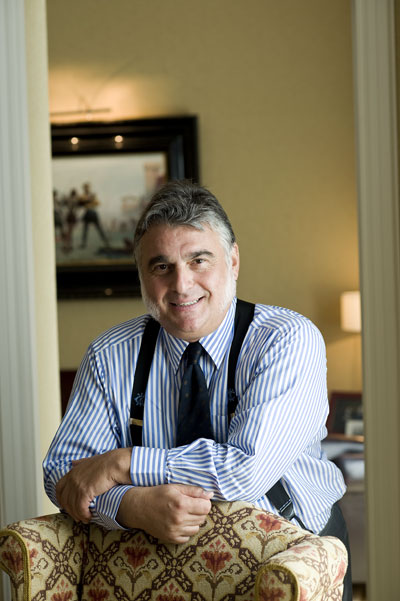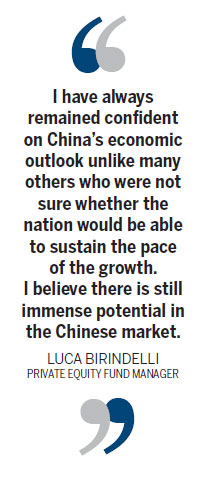Money
European PE firms bet big on China
Updated: 2011-01-14 10:42
By Shi Jing (China Daily European Weekly)
 |
|
Italian lawyer Luca Birindelli set up a private equity fund in 2008, investing in Chinese companies PROVIDED TO CHINA DAILY |
Fund managers keen on equity investments in fast-growing sectors
Rising from an overstuffed chair behind a well-oiled teakwood desk to shake the hand of a visitor, the 54-year-old Luca Birindelli looks typically like an old China hand.
Absentmindedly wiping the frameless glasses stuck to his dark Chinese-style silk jacket with a string, Birindelli, a native of Tuscany, speaks with gestures that belies his reputation as a seasoned observer of Chinese affairs.
A lawyer by profession, Birindelli sold his prosperous practice in China in 2008 to set up a private equity (PE) fund with an initial capital of 100 million euros. Most of the capital for the fund came from Birindelli, while the rest was raised from investors in Europe.
The fund focuses largely on investments in Chinese companies present in fast-growing segments like food and beverages, fashion and accessories, design services, home improvement and decoration, health and fitness, and hospitality and leisure.
Birindelli believes that the Chinese economy will continue to grow at a steady pace. "I have always remained confident on China's economic outlook unlike many others who were not sure whether the nation would be able to sustain the pace of the growth. I believe there is still immense potential in the Chinese market," he says.
Arriving in China in 1987, Birindelli was the first Italian lawyer to obtain a license to provide legal advice to Italian clients in China and for Chinese clients on matters relating to investments in Italy. Since then, he has won recognition as a China expert, whose advice is sought by not only businessmen from Italy, but also from other countries.
Birindelli had 15 years back in his consultations with an aviation company predicting that the government would relax the controls on the private aviation industry.
"Many people thought that I was talking nonsense. But the latest government policy on aviation has proved me correct," he says. "The process is slow. But it is certainly happening."
Foreign investors should remember that things tend to move slowly in China unlike other countries. "In China nothing can be done in haste. You have to be patient and time your investment according to the pace in this country."
This understanding, he says, is the essence of his PE fund.
"We will invest in already existing companies and look to acquire minority stakes by injecting growth capital and management," Birindelli says.
According to Zero2IPO, an integrated service provider for the venture capital and private equity industries, 2010 was a milestone year for the PE market in China as it staged a sharp rebound after the financial problems of 2008 and 2009.
Statistics from Zero2IPO reveal that nearly 82 PE firms qualified to invest in the Chinese mainland completed their fund raising activities in 2010. The total amount raised by them was about $27.62 billion (21.33 billion euros), about 2.13 times the amount raised in 2009.
According to Zero2IPO, overseas PE firms managed to raise more funds than their domestic peers last year .
Birindelli feels that organic food will be one of the mainstays of his investments. That confidence comes from his belief that more and more Chinese consumers are attaching more importance to the quality of their lives.
"The air we breathe every day does not have a price. But it does have a value. Organic food may be more costly, but the people willing to pay for the price will know its value. Going forward I see more and more Chinese embrace this path," Birindelli says.
His zeal for quality of life can also be associated with his experiences with Ferrari and Prada some years ago.
"I worked with Enzo Ferrari, the founder of the company, for the last three years of his life, as his direct assistant in a number of sporting related matters. In 2002, Prada wanted me to be the chairman for the America's Cup. These experiences did help me a lot in China," Birindelli says.
To cash in on his association with Ferrari and his zeal for automobiles, Birindelli has invested personally in an Italian venture that plans to make electric racing cars. The prototype is expected to be ready by next month and it will be made in Asia, primarily China.
"I can no longer fit in a Ferrari. I think the better cars are the Japanese models and I am driving a very reliable Honda in Italy. In Shanghai, I just take a taxi if I want to move around as it is very convenient," says Birindelli.
|
|
"It takes paramount effort to really understand what the situation is like in China," says Birindelli.
Another lesson that Birindelli learnt through the many ups and downs is that "good personal relationship is more important than the set rules specified in the book".
"After a good relationship is built with the partner, you have to make it work and then make it work properly. If the capital injected for the purpose of growth is misused by the people in control, then everyone is in trouble," says Birindelli.
After going through years of negotiations, Birindelli is now "pretty good at determining the quality of his counterpart". But what still rankles him is his inability to speak the language.
"That is my biggest regret. I never had sufficient time to learn Chinese although I settled in Beijing as early as 1992. It has always been a challenge," Birindelli says.
Chen Fangming, an experienced private equity manager based in Shanghai, feels that overseas PE fund managers will be able to better achieve their goals if they can understand Chinese.
"It will also help in localizing the overseas private equity, and have a team that is well acquainted with the local culture and customs," Chen says.
According to Chen, most of the funds usually go to sectors like fast-moving consumer goods and advanced manufacturing companies, which later list themselves on the Frankfurt Stock Exchange.
"There is some restriction on overseas private equity investment in resource companies and the property market," Chen says.
"It is also quite significant to note that in recent years there is more PE funds coming from Europe than from the United States," he says.
According to Chen, European PE firms will, however, encounter slower growth due to their late entry in the Chinese market.
Specials

President Hu visits the US
President Hu Jintao is on a state visit to the US from Jan 18 to 21.

Ancient life
The discovery of the fossile of a female pterosaur nicknamed as Mrs T and her un-laid egg are shedding new light on ancient mysteries.

Economic Figures
China's GDP growth jumped 10.3 percent year-on-year in 2010, boosted by a faster-than-expected 9.8 percent expansion in the fourth quarter.
